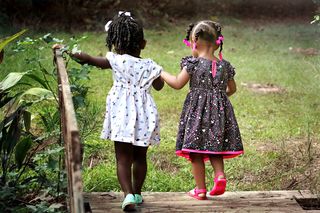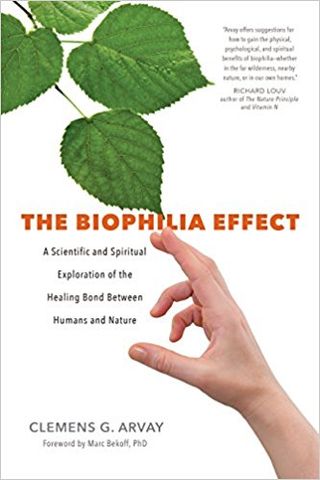Biophilia
The Biophilia Effect: Exploring the Healing Power of Nature
Clemens Arvay's new book shows that nature is in our genes.
Posted January 10, 2018 Reviewed by Devon Frye
A few months ago, I was asked to write a foreword for Clemens Arvay's book called The Biophilia Effect: A Scientific and Spiritual Exploration of the Healing Bond Between Humans and Nature. I was pleased to do this and learned a lot about the importance of people getting out into nature.
Richard Louv, author of seminal books including The Nature Principle, Vitamin N, and Last Child in the Woods, captures the essence and importance of Mr. Arvay's book in his endorsement: “In The Biophilia Effect, Clemens Arvay extends the growing body of literature supporting E.O. Wilson’s biophilia hypothesis. Arvay goes an additional step, offering a multitude of suggestions for how to gain the physical, psychological, and spiritual benefits of biophilia—whether in the far wilderness, nearby nature, or our own homes.”

After I wrote the foreword for The Biophilia Effect, I asked Mr. Arvay if he could answer a few questions and gladly, he agreed. Our exchange went as follows.
"According to the biophilia hypothesis, people have an 'urge to affiliate with other forms of life.' The Biophilia Effect is a book about our reunification with our roots and how this is good for all life in the biosphere."
Why did you write The Biophilia Effect?
Like many people, I was always fascinated by nature. I grew up at the edge of a forest and as a child I observed wild animals there: deer, foxes, rabbits, squirrels, woodpeckers, and many others. At night, I heard the owls hooting.
My grandfather was a forester and botanist. He taught me a lot about trees early in my life. Later, I studied biology and got especially interested in research about the relationship of humans with other species. I wanted to understand why nature captured me, and in general us humans, so much.
The term "biophilia" gave me the answers. The Biophilia Effect was the first of three books I wrote about the human bond with nature. It has been published in 2015 in Germany and I am very happy that the English edition of it will be available in February, 2018.

What does the word "biophilia" mean and why is it an important concept?
The term "biophilia" was originally coined by the German-American philosopher and psychoanalyst, Erich Fromm in the 1960s. With his ideas, Fromm moved close to the drive theory of Sigmund Freud, the founder of psychoanalysis.
Human existence, as Freud put it, represents a constant struggle between Thanatos, the death instinct, and Eros, the life instinct. In a healthy human being, Eros retains the advantage in this game of forces.
In a similar way, Erich Fromm analyzed the hidden processes in the human psyche. In the case of Fromm, it is not Thanatos and Eros that confront each other, but rather necrophilia and biophilia. Derived from ancient Greek, “necrophilia” means “love of the dead,” and “biophilia” means “love of life.” Fromm spoke of human biophilia, when he said: “The person who fully loves life is attracted by the process of life and growth in all spheres.”
Edward O. Wilson, a Professor emeritus of Evolutionary Biology at Harvard University, was the first to introduce Fromm's idea into the biological sciences. If all, or at least most, people have an innate love of living things in nature, this characteristic must be related to our evolutionary history.
Wilson published his “biophilia hypothesis” in the early 1980s, shortly after Fromm’s death. It supposes that our attraction to nature is genetically predetermined. According to this hypothesis, people have an “urge to affiliate with other forms of life."
The biophilia hypothesis is important for understanding human health and disease. Contact with nature is essential for the human psyche. And newest findings have shown that also our physical health depends on influences of nature.
How does your new book follow up on your previous books and essays?
Before The Biophilia Effect, I wrote several critical books on food industries, especially about the treatment of animals, even in organic production. They appeared in German and one of them on was translated into Japanese. How, in our food production, we treat our planet and our natural resources and other animals, says a lot about our problematic relationship with nature. But I always wanted to write positive books with solutions for the future. With The Biophilia Effect I was able to achieve that goal.
What are your major messages?
We are a part of nature and integrated into a functional circle with nature. Everything we do to the ecosystem of the earth we do to ourselves. We need a new understanding of health and disease. Not only do modern pollutants and toxins make us ill, but so too does our disconnection from nature.
The psychological impacts of nature, as well as many bioactive substances of the natural world, are important for the health of all organisms. For example, terpenes from the forest air, derived from trees, significantly increase our immune function and our natural anti-cancer-mechanisms, such as the immune proteins perforine, granulysine and granzymes. By destroying our forest ecosystems we deprive ourselves of those important substances.
Therefore, we have to build a future in which Homo sapiens lives in harmony with its natural habitats. Healthy people and a healthy planet require a human society that takes the responsibility for the earth's ecology. The Biophilia Effect is a book about our reunification with our roots and how this is good for all life in the biosphere.
Who is your intended audience?
I write my books for everybody who is interested in a really ecological future of our species, in which we overcome our separation from nature. It is my aim to supply the scientific evidence for the significant importance of healthy ecosystems for human welfare.
But The Biophilia Effect is also a book with a spiritual dimension. I believe that the human quest for meaning only finds its answers when we look at our roots. We are natural beings and there is a strong bond between humans and other species. As long as we deny this bond or do things that work against it, we will not find mental or emotional balance. Modern society and economy often teach us that we are biological machines, and that we have to "function" and be "productive" and "useful" in an economic way. Nature teaches us that we are part of the mysterious web of life, holistic creatures who cannot be reduced to their brains or their economic importance.
Are you hopeful that in the future, more and more people will spend more time out in nature and become "biophiliacs"?
Absolutely! I believe that we really have the chance to create an ecological future with many more "biophiliacs." However, I am aware of the fact that there are different "forces" at work. I recognize a strong grassroots movement for sustainable and ecological living which continues to grow.
But at the same time, there is a politically influential group of people with strong economic interests who are not interested in a change towards ecology or animal ethics and who also are very influential. With my books, I want to contribute as many scientific arguments as possible for those who are working for positive connections with nature.
What are some of your current and future projects?
"Biophilia" is a strong term. If we understand it well, our biophilic future must include a loving and caring approach toward nonhuman animals.
My next English book titled The Healing Code of Nature will appear in 2018. Unlike The Biophilia Effect, it will be a scientific book from the first to the last page. It does not deal with spirituality and does not contain any breathing exercises or meditation exercises such as those in The Biophilia Effect. I'm looking forward to more publications on that topic and to meet more people who share the aim of a positive ecological future of our species. I believe that cooperation is the way to succeed.
I am also planning to write a book about animal rights. This is one of my strongest, most heartfelt interests since I was 13 years old. That was the age when I stopped eating meat and started my research on livestock farming.
I hope that our biophilic future will also include a new animal ethics, a world without exploitation of our brothers and sisters in the animal kingdom. "Biophilia" is a strong term. If we understand it well, our biophilic future must include a loving and caring approach toward nonhuman animals.
Thank you so much, Clemens, for such an informative interview. It's my pleasure to introduce you to an English reading audience. Your books are incredibly important for personal rewilding and for overcoming alienation from nature. Scientific research shows you are right on the mark. I look forward to seeing an increasing number of "biophiliacs" who exercise and develop their innate connections to all forms of nature. Your books surely will help them along.



